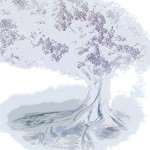The tree of life – a prog rock adventure
First album of Nord in 2018, “The Tree of Life” The tree of life (2018) by Nord is inspired by an ancient Hungarian mythology; Életfa or the Tree of life which is considered to be the center of the world. And like in his last albums, Sztakics István Attila keeps on going and even accentuates his bend towards a fusion of progressive rock and of an EM of the Berlin School style which seduced his new legion of fans since The Hidden Garden of Semiramis. Genesis dipped into Opeth and\or Strawbs marinated in Dream Theater, Nord uses more and more his electric guitars plug-ins on this album. Structuring thus head-bangers rhythms between phases of atmospheres or as complement to a rising electronic rhythm. In the end, “The Tree of Life” ends to be more a progressive rock album decorated with a touch of EM than of its opposite. Exception made of the synth solos which abound on every title with some very esthetic choreographies.
It’s moreover by a very Jeff Beck guitar (Roger Waters-Amused to Death) which roams in ethereal atmospheres that “The Wise Man”, one of the main characters of this mythology, gets open. Some caresses of violins try to float with the suave lyrical harmonies of a splendid voice of goddess which is raised in order to give us shivers with his poignant crescendo of emotionalism. The synth plays on the depth of an Elvish choir for Angels and Devils, while injecting banks of mist in this luxurious decoration where even the twist reverberations the have a beautiful tonal tint. Crystal clear sequences liven up these spasmodic movements of rhythm unique in the arsenal of EM with two tones which head for the same tangent. If songs of a virgin flute tickle our emotions, the heavy riffs very loud of a rock guitar make counterweight. The fluty airs become piercing whereas the rhythm pursues its zigzagging road, a little as Tangram played in speeded-up, with sequences which remove their shadows in order to accelerate a pace which collapses now under the weight of heavy and resonant chords. This rhythmic instability is then whipped by percussions which lead the finale of “The Wise Man” towards a furious almighty mixture of heavy and ethereal, of theatrical progressive rock and electronic which is now the trademark of Nord since some albums. “The Deer and the Horse” are other elements of this Hungarian tale. In music, this is translated by an intro fed of glaucous reverberations and of synth riffs which coos some nice little melodic soloes adorned of sound prisms which remain suspended in this very aerial decoration. Bass pulsations form a structure of rhythm which waves discreetly in this introduction fed of reverberations, solos of uncertain forms, tonal prisms … and riffs of guitar a la David Gilmour (Animals). The door is now open to a rock approach which becomes rather a heavy rock a la Uriah Heep, set apart the jerky riffs of guitars which make very Opeth, with synth solos and layers of Hammond organ which are running on a structure in madness. “The Falcon and the River” follows the same rules, exception made of an introduction blown by celestial voices and also for a rhythm which is slightly slower. The riffs are also sharp-edged and monstrous! And so goes too “The Tree” which adopts the shape of the previous titles with an opening where reverberations, electro-cosmic effects and layers of celestial voices spread a panorama of an idle serenity. A circular movement of the sequencer goes out of these ambiences of which the crescendo pursues its ascent with these big jerky riffs, helped by very rock percussions, which perturb the atmospheres of this album while preserving a level of rhythmic uncertainty convenient for good synth solos which sound very David Wright. “Trance” is a beautiful electronic ballad which gets transformed into a copy of Power Ballad. The same goes for “Completion” which concludes “The Tree of Life” with the very theatrical rock vision heavy and incisive from Nord.
Sylvain Lupari (May 15th, 2018)

